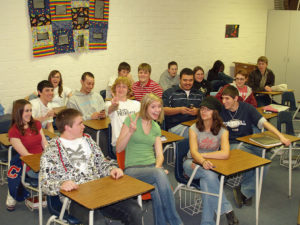Amidst the death and suffering arising from the coronavirus crisis, people have an opportunity to ponder some important questions about life and liberty. One question arises in the context of when state and local officials should force children back into school: Why should the state be involved in education at all?
Since all of us are born and raised under the public schooling system, it’s difficult to imagine a different paradigm, one in which education and the state are separated. But throughout history, all great achievements in liberty have involved people thinking outside the box and adopting a new paradigm, especially when the old paradigm has proven to be defective.
Consider the separation of church and state. Today, we all take it for granted. If the state began enacting laws forcing people to attend church or forcing them to send their children to church, people would be outraged. Everyone would recognize the wrongfulness, even the tyranny, of such laws.
Why then do we accept a paradigm in which the state forces parents to send their children to a government (i.e., “public”) school or a private school? Why not simply leave educational decisions to parents, just like we leave religious decisions to them?
One reason cited is that some parents are so irresponsible that they would not have their children educated. But couldn’t the same argument be made with respect to religion — that some people are so irresponsible that they don’t expose their children to God? We have developed an extremely high degree of tolerance when it comes to how people raise their children with respect to religion. Why can’t we develop the same degree of tolerance when it comes to education?
Anyway, education is a seeking process. Children have a remarkable capability of learning new things on their own, especially when they develop a passion for some particular subject or area. The passion for learning in one area inevitably expands into other areas.
Contrast that seeking method of education to the cramming method that is used in public schools. Obsessed with making certain that students are being educated, public schoolteachers cram information into children’s heads, make them memorize it, and then constantly test them to make certain they are being educated.
Natural learning is fun. Kids will often want to stay up late at night continuing to read something about which they become passionate. No one ever seems to have fun in the highly regimented and controlled environment of public schooling. Hour after hour, students just mindlessly go from classroom to classroom when the bell rings, much like conscripts do in the army.
At the core of the state’s educational system is force. The state’s compulsory-attendance laws coerce people into sending their children to school. Any enterprise that depends on force to get its customers has to be considered suspect.
It’s the same with funding. Unlike private businesses, which depend on satisfying consumers, the state simply taxes people to get its revenues. Any enterprise that depends on forcibly taking money from people to fund its operations has to be considered suspect.
What about the poor? They don’t have any problems finding churches to go to. The wealthy and the middle class donate their money to build the churches and never bar the poor from any of them. Why wouldn’t we expect the same attitude in education in the form of free or deeply discounted tuition, scholarships, fellowships, and the like?
Moreover, the free market serves the poor in other areas, such as lower-priced cars, housing, clothing, and food. Why wouldn’t we expect educational entrepreneurs to do the same in the area of education?
America’s heritage is one of free markets — that is, human activity that is free of government control and regulation. Fee markets produce the best of everything. Why not a free market in education? Why not keep the public schools closed? Why not separate school and state?




